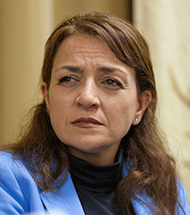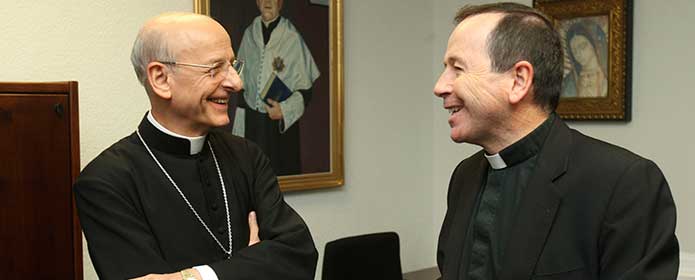"What a pity that I had to live through an attack to realise that God was tracing my path to heaven".
Esther Sáez, victim of the 11-M attacks, participated in the Schools Eclesiasticas in a roundtable on the occasion of the feast of St. Thomas Aquinas.

"What a pity that I had to live through an attack to realize that God was tracing the road to heaven for me". This was stated at the University of Navarra by Esther Sáez, victim of the 11-M attacks, on the occasion of her participation in the roundtable "The meaning of human suffering", organized by the Schools of Theology and Ecclesiastics of Philosophy in celebration of his patron saint, St. Thomas Aquinas.
Through her testimony, Esther Sáez, pharmacist, researcher and mother of two children, shared the most painful but also the most intimate part of the attack she suffered when she was traveling in the carriage in which the bomb exploded at the El Pozo station in the March 11, 2004 attack in Madrid.
He recalls that he arrived conscious at the Gregorio Marañón hospital but with his hepatic artery severed, his lungs burst and burned, and his head burned from behind. "The doctors gave me 24 hours to live."
He assures that he has forgiven the terrorists from "the beginning", because he is not here to "judge anyone" and wants to tell his testimony to show how "the Lord is able to bring light and beauty in the face of any status".
When she came out of the coma she had no memory of anything because of the clot in her head, not even that she had children: "That was one of the things that caused me the most pain. Everything was nonsense. I cried in despair. Until a voice inside told me 'don't be afraid'. Then I was angry and thought 'didn't you say you would always be with me, why did you allow this? Then I understood that I could not reproach God for anything, because he had not done it with me. Never before had I spent even a second of time looking at the offenses I had done to him. I met Christ's gaze. I am 67% handicapped, have had 13 operations, and suffer chronic pain, but I am an immensely happy person".
The meaning of human suffering, from four perspectivesThe roundtable, which was attended by more than 200 people including students, professors and staff no professor of the Schools Ecclesiastical, offered four approaches to the meaning of human suffering: from the point of view of a victim of terrorism, from the point of view of psychology, from the point of view of the Philosophy and from the theological point of view. For this purpose, in addition to the testimony of Esther Sáez, Marina Martínez, psychologist of the Clínica Universidad de Navarra and specialist in palliative care; Ricardo Piñeiro, professor of the School of Philosophy and Letters; and Tomás Trigo, priest and professor of the School of Theology, participated in the session.
Esther Sáez also offered her testimony in the talk-colloquium "I was looking outside for what was inside", organized that same afternoon by Office of the Vice President of Students, in which some 300 people participated, including students and professors from different disciplines of the academic center.

